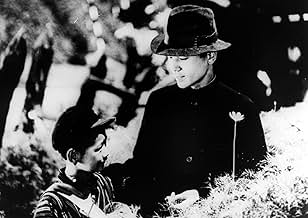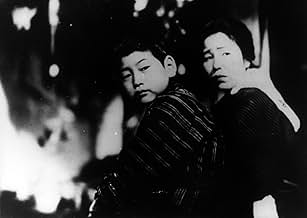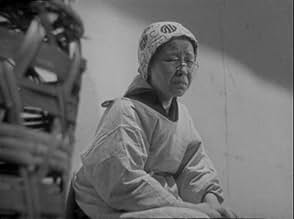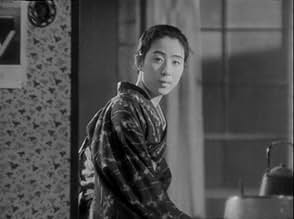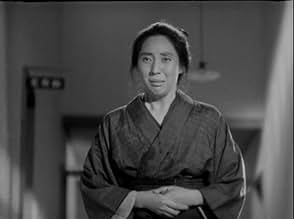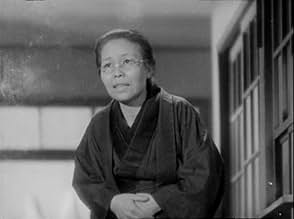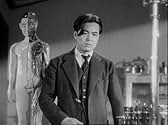IMDb रेटिंग
7.7/10
4.3 हज़ार
आपकी रेटिंग
अपनी भाषा में प्लॉट जोड़ेंA widow sends her only son away to receive a better education. Years later, she visits him, finding him a poor school teacher with a wife and son.A widow sends her only son away to receive a better education. Years later, she visits him, finding him a poor school teacher with a wife and son.A widow sends her only son away to receive a better education. Years later, she visits him, finding him a poor school teacher with a wife and son.
- निर्देशक
- लेखक
- स्टार
Jun Yokoyama
- Okubo's son
- (as Bakudan Kozô)
Tomio Aoki
- Tomibo
- (as Tokkan Kozô)
Seiichi Katô
- Kinjo no ko
- (as Seiichi Kato)
फ़ीचर्ड समीक्षाएं
Of all the major directors in the world, Ozu was the last one to convert to sound; "The Only Son" was his first "all-talkie" film (in 1936), and it is remarkably inventive (technically) as well as deeply moving. Once again, his film deals with family dynamics: in this case, a widowed mother who has worked selflessly to provide her son with an education. But when she goes to visit him, she finds that he has not fulfilled his promise: he's stuck in a mediocre job, he has a wife and child and can't make any drastic changes because of his responsibilities. The ways that the mother and son try to reach an understanding, and their mutual resignation to the disappointments of life, create a glancing but powerful sense of that "quiet desperation" which was so often Ozu's theme.
While having the privileged importance of being great director Yasujiro Ozu's first sound film, The Only Son also remains important for its emergence as the first truly "Ozu" work, in the sense that the very particular cinematic and thematic elements which make up what he is best known for coalesce together in a thoroughly emotional experience.
The story is simple enough, as Ozu usually tells. A widow attempts to save enough money for her son to go to college in Tokyo. She visits him years later, only to discover that he is not living the kind of sophisticated, well-off life she believed he would lead as a result of a college degree. What Ozu does with these characters is astonishing; he shows them in the most serene and simple of situations and settings yet uses his unique directing style to elicit subtle feelings and thoughts simmering just below the surface.
What this seems to suggest is Ozu's feelings regarding Japan in the 1930s, a tumultuous period in which the age of modernization seemed to be waning and Japanese society continued to be pressured into a militaristic hegemony. Clearly, Ozu resisted these transitions and his best offense was the films he made. The result is a quiet, gentle yet intense story about simple people wishing their lives, or the lives of their children, were better than they are. Through this, Ozu seems to reflect on the failure of Japanese innovation up to that point and the uncertainty of what the future might bring. Fortunately for the viewer, his specific style and insight remain as coherent and profound as ever.
The story is simple enough, as Ozu usually tells. A widow attempts to save enough money for her son to go to college in Tokyo. She visits him years later, only to discover that he is not living the kind of sophisticated, well-off life she believed he would lead as a result of a college degree. What Ozu does with these characters is astonishing; he shows them in the most serene and simple of situations and settings yet uses his unique directing style to elicit subtle feelings and thoughts simmering just below the surface.
What this seems to suggest is Ozu's feelings regarding Japan in the 1930s, a tumultuous period in which the age of modernization seemed to be waning and Japanese society continued to be pressured into a militaristic hegemony. Clearly, Ozu resisted these transitions and his best offense was the films he made. The result is a quiet, gentle yet intense story about simple people wishing their lives, or the lives of their children, were better than they are. Through this, Ozu seems to reflect on the failure of Japanese innovation up to that point and the uncertainty of what the future might bring. Fortunately for the viewer, his specific style and insight remain as coherent and profound as ever.
Incredibly gentle and touching Ozu picture about a single mother who works her butt off to send her only son off to school. Many years later, we follow her journey to visit that son in Tokyo. He hasn't kept in contact very well. His mother doesn't even know about his wife and infant son, nor that he is a grade school teacher, a rather low (and low-paid) position. Simply put, he's embarrassed at the little he has accomplished and he thinks his mother will be gravely disappointed that she went to so much trouble to educate him. The whole situation really hit home, and I was deeply moved by it. The film also features incredible cinematography and editing.
The simple story follows Tsune (Choko Iida), a widow and single mother who struggles in a factory job to provide for her son Ryosuke. She sacrifices everything in her own life to pay to send Ryosuke off to the best middle and high schools, toiling away at her thankless job while never getting to see her son. It's not until many years later, when the now-grown Ryosuke (Shin'ichi Himori) gets a surprise visit from his mother at his Tokyo home, that the two assess their lives.
This was Ozu's first sound film, and he can't help but poke fun at the format, with one scene seeing Ryosuke and Tsune attending a "talkie" movie, the old woman's first, only for her to fall asleep during it. But while there are many moments of gentle humor, this is largely a serious affair, taking an unflinching look at familial obligation and expectation. The film asks what the true measure of a man is. Is it financial success, material wealth, a nice home and fat bank account? Or can it be strength of character and generosity of spirit? Ozu doesn't give any definitive answer, and the final sequence of the film leaves the true feelings of Tsune toward her son rather ambiguous.
This was Ozu's first sound film, and he can't help but poke fun at the format, with one scene seeing Ryosuke and Tsune attending a "talkie" movie, the old woman's first, only for her to fall asleep during it. But while there are many moments of gentle humor, this is largely a serious affair, taking an unflinching look at familial obligation and expectation. The film asks what the true measure of a man is. Is it financial success, material wealth, a nice home and fat bank account? Or can it be strength of character and generosity of spirit? Ozu doesn't give any definitive answer, and the final sequence of the film leaves the true feelings of Tsune toward her son rather ambiguous.
This is a nice piece of work from early Japanese cinema that's worth checking out for all fans of this period's films.
The plot is simple, nothing really special if you ask me, but Ozu sure knew how to handle this kind of simple stories he portrayed in all his films. It's a slow-paced film, which adds a more natural feeling to it in my opinion, full of powerful and emotional images supported by a really splendid and natural acting (as usual in Ozu's films).
Ozu really stands out from many other directors, he had the ability to portray life on screen and here you can definitely see it.
At first this kind of filmmaking didn't do much for me, but it has really grown on me with time. It surely is not for everyone; Ozu is just different cinema.
My score: 8.5/10
The plot is simple, nothing really special if you ask me, but Ozu sure knew how to handle this kind of simple stories he portrayed in all his films. It's a slow-paced film, which adds a more natural feeling to it in my opinion, full of powerful and emotional images supported by a really splendid and natural acting (as usual in Ozu's films).
Ozu really stands out from many other directors, he had the ability to portray life on screen and here you can definitely see it.
At first this kind of filmmaking didn't do much for me, but it has really grown on me with time. It surely is not for everyone; Ozu is just different cinema.
My score: 8.5/10
क्या आपको पता है
- ट्रिवियाThis was Yasujirô Ozu's first feature film with all-synchronous dialogue.
- कनेक्शनFeatured in A Train Arrives at the Station (2016)
- साउंडट्रैकOld Black Joe
Written by Stephen Foster
टॉप पसंद
रेटिंग देने के लिए साइन-इन करें और वैयक्तिकृत सुझावों के लिए वॉचलिस्ट करें
- How long is The Only Son?Alexa द्वारा संचालित
विवरण
- रिलीज़ की तारीख़
- कंट्री ऑफ़ ओरिजिन
- भाषाएं
- इस रूप में भी जाना जाता है
- The Only Son
- उत्पादन कंपनी
- IMDbPro पर और कंपनी क्रेडिट देखें
- चलने की अवधि1 घंटा 22 मिनट
- रंग
- ध्वनि मिश्रण
- पक्ष अनुपात
- 1.37 : 1
इस पेज में योगदान दें
किसी बदलाव का सुझाव दें या अनुपलब्ध कॉन्टेंट जोड़ें


